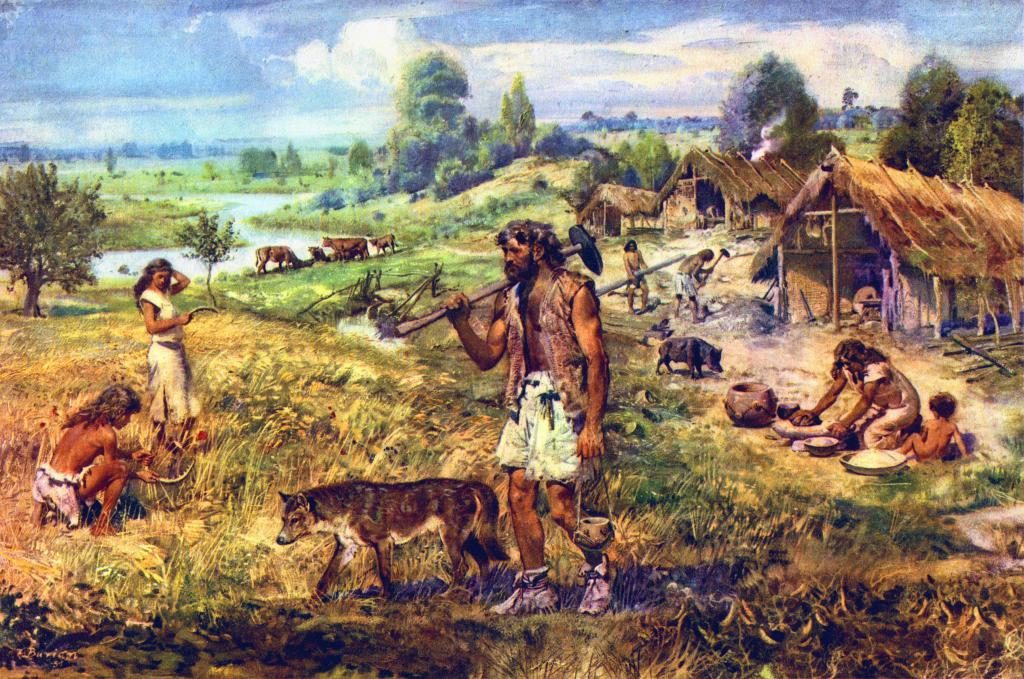Early humans before the neolithic era lived in small nomadic communities. Certain prehistoric communities started to make their own innovations regarding tools. They were able to start domesticating animals and growing plants for use, which would in turn allow them to start living in villages, or larger groups. The Neolithic Age was a period in the development of human technology, beginning about 10,000 BCE, in some parts of the Middle East, and later in other parts of the world, and ending between 4,500 and 2,000 BCE.
In earlier periods of time, people usually lived in non-permanent structures, such as tents, that could be picked up and transported very easily. Now with the development of agriculture, technology and the inventions of more sophisticated tools used in agriculture, people of the Neolithic Era were able to build permanent shelters. This gave them the ability to grow crops in the surrounding area. People started to develop their control over fire, which allowed for different uses soon after this. One of these uses of fire was the early stages of pottery. Humans began to dry clay for uses around the household. Hunting also became much easier to accomplish with the introduction new of stone tools. The most common tools used were daggers and spear points, used for hunting, and hand axes, used for cutting up different meats, and scrappers, which were used to clean animal hides.1

Advances in tool-making and domestic technology led to advances in agriculture. Farming started a revolution in the world and helped set us on a path that would eventually lead to the technological revolution and invention of different things. Inventions such as the plow helped in the planting of seeds. One essential benefit of the development of farming technology was the possibility of producing surplus crops, or food supplies that surpassed the immediate needs of the community. Surpluses could be stored for later use, or possibly traded for other necessities or luxuries. Agricultural life afforded securities that nomadic life could not, and farming in one place resulted in population growth far beyond that of hunters and gatherers. Soon after plant domestication began, animal domestication followed. The raising of cattle, sheep, and pigs for food replaced the necessity of daily hunting. The creation of stone tools also helped to advance the making of clothing. It was now possible to sheer wool and spin it into yarn to make more advanced clothing that made for better protection against the elements.2
Agriculture during this time period gave the human species a new feeling of security that their past way of life could not. However, this new way of living created new problems within the communities. Famines and pests yielded new diseases that the people of this era had not seen before. Sanitation became a problem due to the fact that most primitive villages did not have a proper form of waste disposal. Due to the fact that agriculture led to technological innovations it can be said that the Neolithic Era was the catalyst for the future of technology.3
- M.P. Richards, “A Brief Review of the Archaeological Evidence for Palaeolithic and Neolithic Subsistence,” European Journal of Clinical Nutrition 56, no. 12 (2002): Published Online. ↵
- Melanie Boyd, “The different paths of the neolithic revolution in Egypt and Sudan,” Anthrojournal Vol. 2 May 2014, Published Online. ↵
- Hugh James Freeman, “The Neolithic Revolution and Subsequent Emergence of the Celiac Affection,” International Journal of Celiac Disease 1, no. 1 (2013): 19–22. ↵



28 comments
Johnson
Very interesting article I found this very important for my school paper.
Isuru Wickramasinghe
good articale happy to read it
thank you.
Peyton Johnson
Early humans before the (related to the late Stone Age) time in history lived in small wandering communities. The Neolithic Revolution is also called the Agriculture Revolution. It is said to have started 12,000 years ago. Foragers became Farmers.
Julie
Very interesting; thank you. There is a spelling error. The word is to “shear “ sheep, not “sheer.” Very nicely written. Cheers.
Sharriah Martinez
This was a very interesting article . The Neolithic era was where it all began, although some people might think they were dumb & there was no intellect that is not true. These people developed skils adn grew on these developed skills for years to come. This Era allowed us to live the life we do know actually.
Diego Terrazas
Agriculture is a huge step forward for humanity. The nomadic life is not ideal since it requires a lot of energy. Plant domestication was crucial in providing grain along with pottery, which stores the grain. Animal domestication is also important when it came to the dog, which helped in gathering animals. The manufacturing of cloth was also crucial in providing warmth.
Matthew Swaykus
This was a very inciteful piece, citing humanity’s first steps toward a civil society. We faced problems such as disease and wide starvation on a scale our species had never seen before. Admittedly, as an environmental scientist, it does sadden me to see how our species was able to grow uncontrollably to the point where starvation and crop failure could occur. Death is always morbid, but the real tragedies stem from one’s own undoing.
Michael
Nice piece of write up
Christopher Hohman
Nice article. The agriculture revolution was a hugely important event in the history of our species and the world. Because of the agricultural revolution humans were able to settle down into larger communities and thus they were also able to create more complex societies. This in turn led to a more advanced culture that could have included a religion, writing, and a code of laws. It is also true that the agriculture revolution gave birth to some new problems such as disease and insects and not to mention personal quarrels.
Michael Hinojosa
It’s a bit funny to me knowing that we think of the humans in the neolithic era as primitive and barbaric yet it’s because of them that we have the technologically advanced society we have today! To think it was possible for these primitive beings to learn how to make tools and learn how to farm as well is definitely something that really scratches the head and makes you wonder just how smart they actually were and truly how their societies worked back in those times as well.
Lilliana Canales
Personally, I find the neolithic era quite fascinating. It’s amazing that people who were no where near as mentally advanced as we are now were able to think of helpful tools for survival such as the plow, domestication of animals and plants and even farming. It’s always made me question how these ideas came to be and how did they know it would be successful. The neolithic era has to be the most important era in human civilization, mainly because of the agricultural aspects, and of course the technological advancements. As a race, humans have come a long way and the neolithic era plays a key role in humanities success.